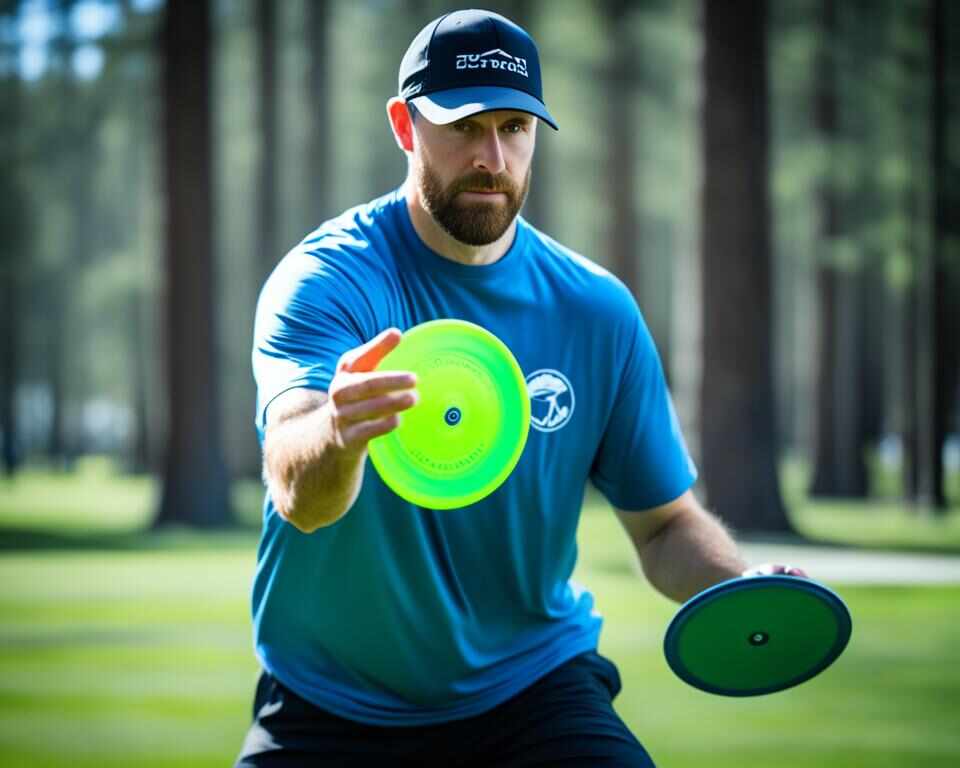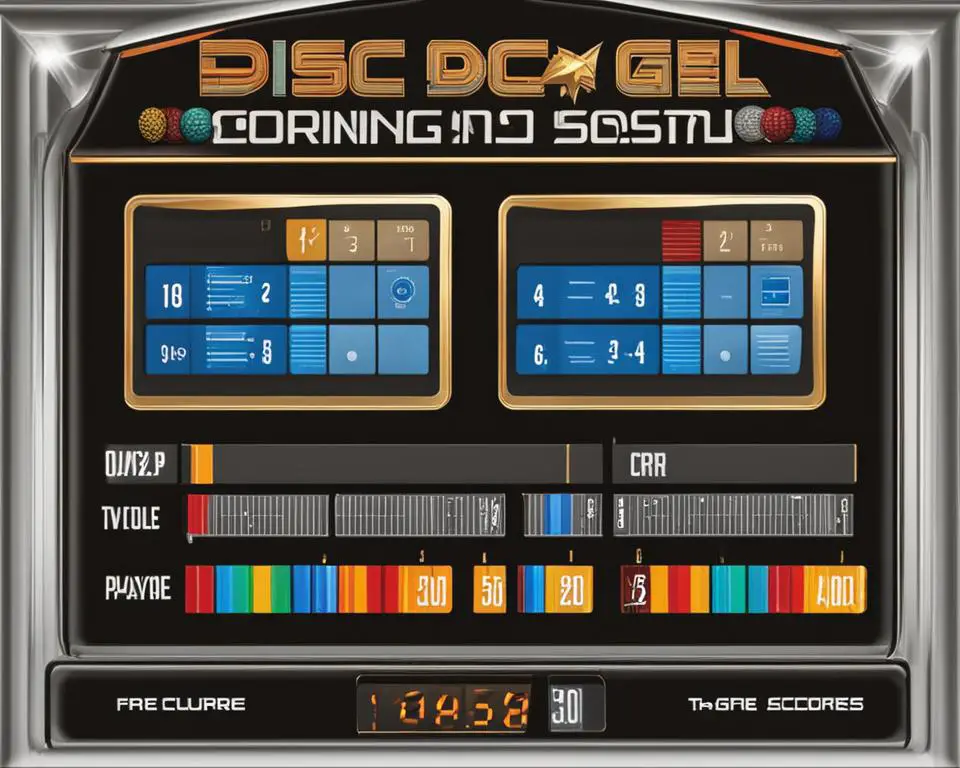Have you ever wondered why some disc golfers seem to effortlessly navigate the course, consistently scoring under par, while others struggle to keep up, grappling with bogeys and double bogeys at every turn? What’s the secret behind their success, and how does disc golf scoring really work?
In this article, we’ll dive deep into the intricacies of disc golf scoring, unraveling the mystery behind the numbers and uncovering the strategies that separate the pros from the amateurs. Get ready to unlock the secrets of disc golf scoring and take your game to the next level.
Key Takeaways:
- Course Management is Crucial: Assessing hole challenges and strategically selecting shots can significantly impact your disc golf scores.
- Know Your Discs and Techniques: Understanding disc flight characteristics and practicing versatile throwing techniques can enhance your performance on the course.
- Plan Shots Wisely: Minimize risks by carefully assessing each shot and opting for safer alternatives when unsure.
- Stay Focused and Confident: Mindfulness practice and positive self-belief are essential for maintaining mental resilience and consistency in disc golf scoring.
- Consistency is Key: By integrating these strategies into your game plan and practicing them regularly, you can improve your disc golf scores and elevate your overall performance on the course.

Introduction to Disc Golf Scoring
Have you ever played a round of disc golf and found yourself puzzled by the numbers on the scorecard? Understanding disc golf scoring is key to enjoying the game to its fullest. Disc golf, much like traditional golf, involves completing each hole in as few throws as possible. However, instead of using clubs and balls, players use specialized discs designed for different distances and flight characteristics.
What is Disc Golf?
At its core, disc golf mirrors traditional golf, but instead of clubs and balls, players use specially designed discs to navigate a course filled with obstacles like trees, bushes, and water hazards. The objective remains the same: complete each hole in the fewest number of throws possible. From open fields to densely wooded areas, disc golf courses offer a diverse range of challenges that test a player’s accuracy, distance control, and strategic thinking.
Importance of Scoring in Disc Golf
Scoring in disc golf serves as a measure of a player’s skill, consistency, and performance on the course. It goes beyond simply tallying throws; it reflects a player’s ability to adapt to various course conditions, make strategic decisions, and maintain composure under pressure. Understanding the nuances of scoring is essential for players looking to improve their game and compete at higher levels.
In the following sections, we’ll explore the fundamentals of disc golf scoring, from deciphering par to mastering different scoring methods. Get ready to unravel the mystery behind disc golf scoring and discover the keys to achieving your best score on the course.
Basics of Disc Golf Scoring
Scoring in disc golf is like keeping score in traditional golf, but with some unique twists. To understand disc golf scoring, let’s start with the concept of par.
Understanding Par
In disc golf, each hole on the course is assigned a par value, representing the number of throws an expert player is expected to take to complete the hole. Par values typically range from 3 to 5 throws per hole, depending on the distance and difficulty of the hole.
- Definition of Par: Par is the benchmark score that skilled players aim to match or beat on each hole. It serves as a reference point for evaluating performance.
- Determining Par for Each Hole: Course designers assess factors such as hole length, terrain, and obstacles to determine the appropriate par for each hole. Longer and more challenging holes are assigned higher pars, while shorter and easier holes have lower pars.
Scoring Terminology
To keep track of scores during a round of disc golf, players use a variety of terms to describe their performance on each hole.
- Birdies, Pars, and Bogeys: A birdie occurs when a player completes a hole in one throw fewer than par. Achieving a birdie is a sign of skill and precision. On the other hand, a bogey occurs when a player takes one throw more than par to complete a hole. Bogeys are considered setbacks but are common among players of all skill levels. Finally, a par is achieved when a player completes a hole in the same number of throws as the par value.
- Eagles and Albatrosses: Exceptional players may achieve eagles or even albatrosses on certain holes. An eagle occurs when a player completes a hole two throws under par, while an albatross occurs when a player completes a hole three throws under par. These feats are rare and are celebrated as remarkable achievements in the sport.
Understanding these scoring terms is essential for evaluating performance and setting goals during a round of disc golf. By striving for birdies and pars while minimizing bogeys, players can work towards improving their scores and mastering the game.
Methods of Disc Golf Scoring
Scoring in disc golf can be approached in different ways, depending on the format of play. The two primary methods are stroke play and match play, each with its own set of rules and strategies.
Stroke Play Scoring
Stroke play is the most common method of scoring in disc golf, resembling the traditional scoring system used in golf. Here’s how it works:
Counting Throws per Hole
In stroke play, players count the number of throws (or “strokes”) it takes to complete each hole. The objective is to complete each hole in as few throws as possible. For example, if a hole is a par 3 and a player completes it in three throws, they are said to have made par.
Totaling Scores for the Round
After completing all the holes in a round, players total their scores by adding up the number of throws for each hole. The player with the lowest total score at the end of the round is the winner. Scores can be recorded on a scorecard, with each hole’s score compared to par to determine performance relative to the course difficulty.
Match Play Scoring
Match play offers a different scoring dynamic, focusing on individual holes rather than overall round scores. Here’s a breakdown:
Hole-by-Hole Scoring
Winning Holes and Matches
Players earn points for winning individual holes, typically one point per hole won. The player who wins the most holes during the match is declared the winner. Match play can be particularly strategic, as players may adjust their gameplay based on the status of the match, focusing on securing individual holes rather than overall score.
Understanding the differences between stroke play and match play scoring can help players adapt their strategies to different formats of play and maximize their performance on the disc golf course.

Factors Influencing Disc Golf Scoring
Scoring well in disc golf isn’t just about throwing far or accurately; it’s about understanding how various factors impact your performance on the course. Let’s dig into some of the things that can affect your scores:
Course Difficulty and Layout
The layout of a disc golf course can have a big effect on how well you score. Here’s why:
- Course Design: Some courses have narrow fairways, lots of trees, and tricky terrain, making it tough to get your disc where you want it. On the other hand, more open courses with fewer obstacles can give you more chances to score well.
- Adjusting Expectations: When you’re playing a tough course, it’s important to set realistic goals. You might need to play it safe on tricky holes to avoid big mistakes, while taking advantage of easier ones to pick up strokes.
Weather Conditions
The weather can make a big difference in how you play. Here’s how different conditions can affect your game:
- Wind, Rain, and Temperature: Wind can mess with your disc’s flight path, making it harder to control. Rain can make discs slippery and courses muddy, while extreme temperatures can change how your discs fly.
- Adapting to the Weather: To handle bad weather, you might need to change up your throwing style, pick different discs, and adjust your game plan to deal with the conditions.
By understanding and working with these factors, you can improve your chances of scoring well no matter what challenges the course or the weather throws your way.
Strategies for Improving Disc Golf Scores
Mastering Course Management
Effective course management is crucial for scoring well in disc golf. Consider the following:
- Assessing Hole Challenges: Evaluate each hole’s layout and obstacles to make informed decisions.
- Strategic Shot Selection: Choose shots that minimize risks and maximize scoring opportunities.
Understanding Discs and Techniques
Knowing your equipment and refining your throwing techniques can significantly impact your scores. Here’s what to focus on:
- Disc Flight Characteristics: Understand how different discs behave in various conditions, such as wind and terrain.
- Versatile Throwing Techniques: Experiment with different throwing styles, such as backhand and forehand, to expand your repertoire.
Planning Shots Wisely
Avoiding mistakes is key to consistent scoring. Follow these guidelines:
- Risk Assessment: Consider the potential risks and rewards of each shot before committing.
- Safe Execution: Opt for safer shots that keep you out of trouble, especially when uncertain.
Maintaining Focus and Confidence
Staying mentally sharp and confident throughout the round is essential. Here’s how to stay on track:
- Mindfulness Practice: Stay present and focused on the current shot, avoiding distractions and negative thoughts.
- Positive Self-Belief: Cultivate confidence in your abilities and draw strength from past successes to fuel your performance.
By integrating these strategies into your game plan and consistently applying them during play, you can enhance your disc golf scores and elevate your overall performance on the course.

Conclusion
In conclusion, understanding how disc golf scoring works is essential for players looking to improve their performance on the course. By mastering course management, refining throwing techniques, making strategic shot selections, and maintaining focus and confidence, players can elevate their game and achieve better scores.
Disc golf scoring is not merely about throwing the disc; it’s about making informed decisions, managing risks, and staying mentally resilient throughout the round. With dedication, practice, and a structured approach to improvement, players can unlock their full potential and enjoy greater success in disc golf. So, whether you’re a beginner or a seasoned player, applying these strategies can lead to a more rewarding and enjoyable disc golf experience.


